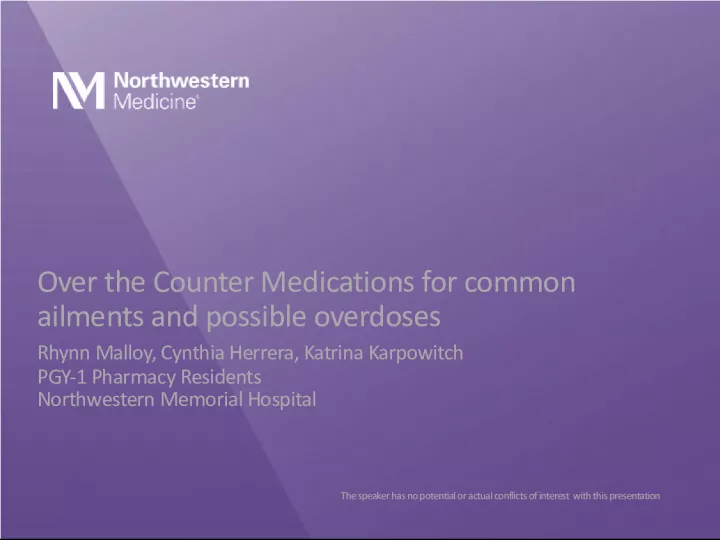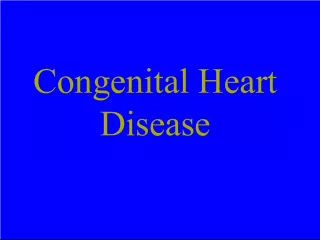Over the Counter Medications for Common Ailments and Possible Overdoses


This presentation, conducted by PGY 1 Pharmacy Residents from Northwestern Memorial Hospital, covers the use and possible overdoses of over the counter medications for common ailments such as pain, flu, cold, heartburn, and upset stomach. The presentation also discusses non-steroidal anti-inflammatory drugs (NSAIDs) like ibuprofen, aspirin, naproxen, and others and their uses in treating pain, inflammation, migraines, and dysmenorrhea.
- Uploaded on | 2 Views
-
 bennett
bennett
About Over the Counter Medications for Common Ailments and Possible Overdoses
PowerPoint presentation about 'Over the Counter Medications for Common Ailments and Possible Overdoses'. This presentation describes the topic on This presentation, conducted by PGY 1 Pharmacy Residents from Northwestern Memorial Hospital, covers the use and possible overdoses of over the counter medications for common ailments such as pain, flu, cold, heartburn, and upset stomach. The presentation also discusses non-steroidal anti-inflammatory drugs (NSAIDs) like ibuprofen, aspirin, naproxen, and others and their uses in treating pain, inflammation, migraines, and dysmenorrhea.. The key topics included in this slideshow are Over the Counter Medications, Possible Overdoses, Pain, Flu, Cold, Heartburn, Upset Stomach, NSAIDs, Ibuprofen, Aspirin, Naproxen, Fevers, Rheumatoid Arthritis, Gout, Osteoarthritis Pain, Musculoskeletal Pain, Bone Pain, Dysmenorrhea Pain, Migraines,. Download this presentation absolutely free.
Presentation Transcript
1. Over the Counter Medications for common ailments and possible overdoses Rhynn Malloy, Cynthia Herrera, Katrina Karpowitch PGY-1 Pharmacy Residents Northwestern Memorial Hospital The speaker has no potential or actual conflicts of interest with this presentation
2. What can be treated? Pain The common Flu/Cold Heartburn/Upset stomach 2
3. Pain
4. Non-Steroidal Anti-Inflammatory Drugs (NSAIDs) Ibuprofen (Advil, Motrin) Naproxen (Naprosyn, Aleve) Aspirin Uses: Fevers Rheumatoid arthritis/Gout/Osteoarthritis pain/inflammation Musculoskeletal pain/Bone pain Dysmenorrhea pain Migraines 4
5. Non-Steroidal Anti-Inflammatory Drugs (NSAIDs) Contraindications : Peptic Ulcer Disease Renal/Kidney Disease Hypertension/Heart Failure Coronary Artery Disease (CAD) Cardiovascular Disease (CVD) Alternative if you have Peptic Ulcer Disease or increased bleeding risk: Celebrex 5
6. Non-Steroidal Anti-Inflammatory Drugs (NSAIDs) Doses: Ibuprofen: 200mg every 4-6 hours as needed Max dose: 1,200mg in 24 hours Treatment >10 days not recommended Aspirin: 325mg every 4-6 hours as needed Max dose: 4,000mg in 24 hours Naproxen (sodium): 220 mg every 8-12 hours Max dose: 660mg in 24 hours 6
7. Non-Steroidal Anti-Inflammatory Drugs (NSAIDs) Side Effects: Dyspepsia (indigestion) Ulcers Nausea Gastrointestinal bleeding Rash/Itching Kidney damage 7
8. Acetaminophen (Tylenol) Uses: Fevers Injury/Trauma pain Cramping, aches Contraindications: liver disease Doses: 325mg every 4-6 hours Max dose: 4,000mg in 24 hours Overdose = #1 cause of acute liver failure in the US 8
9. Insomnia
10. Melatonin Uses: Insomnia Limited evidence that it is effective Dose: 0.3mg to 5mg at bedtime Side effects: largely unknown 10
11. Valerian Root Uses: Insomnia Limited evidence that it is effective May take weeks of nightly use to be effective Dose: 400 -900mg at night Side effects: if withdrawn abruptly, may cause heart complications and withdrawal sympmtoms 11
12. Antihistamines Diphenhydramine Uses Insomnia Allergic reactions (skin rashes, hives) Congestion 12
13. Antihistamines Contraindications: Urinary retention Prostate enlargement Angle closure glaucoma Cardiovascular disease Patients of advanced age- may interact with medications and will increase fall risk 13
14. Antihistamines Doses: Diphenhydramine: 25-50mg before bed Max use : do not exceed 14 days of nightly use May develop tolerance in 2-3 nights 14
15. Antihistamines Side effects: Sedation extending into morning after Dry mucous membranes Elevated body temperature Constipation Blurred vision Urinary retention 15
16. Cold/Flu Management
17. Antihistamines Diphenhydramine Doxylamine Uses: Sinus and nasal congestion, allergy relief Insomnia 17
18. Decongestants Contraindications: Hypertension/Heart Failure Coronary Artery Disease (CAD) Cardiovascular Disease (CVD) Asthma Chronic Obstructive Pulmonary Disease (COPD) Alternative agents to use in hypertension: Antihistamines: desloratadine (Clarinex), fexofenadine (Allegra), cetirizine (Zyrtec) 18
19. Decongestants Doses: Phenylephrine HCl: 10mg every 4 hours as needed Max dose : 60mg in 24 hours Pseudoephedrine: 60mg every 4-6 hours as needed Max dose : 240mg in 24 hours Nasal sprays: Ephedrine 0.5%: 2-3 drops not more often than every 4 hours 19
20. Decongestants Side effects: Elevated blood pressure Palpitations, arrhythmias, fast heart beat Restlessness, insomnia Anxiety Rebound congestion Occurs within 3-5 days of continuous use 20
21. Antitussives and Protussives (Expectorants) Dextromethorphan (antitussive) Guaifenasin (expectorant) Uses: Cough related to post-nasal drip Chest congestion 21
22. Contraindications: Hypertension/Heart Failure Coronary Artery Disease (CAD) Cardiovascular Disease (CVD) Asthma, chronic bronchitis Chronic Obstructive Pulmonary Disease (COPD) 22 Antitussives and Protussives (Expectorants)
23. Antitussives and Protussives (Expectorants) Doses: Dextromethorphan: 10-20mg every 4 hours or 30mg every 6-8 hours Max dose : 120mg in 24 hours Guaifenasin (expectorant): 200-400mg every 4 hours Max dose : 2,400mg (2.4g) in 24 hours CAUTION : beware of combination products! 23
24. Antitussives and Protussives (Expectorants) Side effects: Drowsiness OR excitation, nervousness Dizziness Headache Stomach discomfort, nausea, constipation Respiratory depression in high doses 24
25. Heartburn
26. Heartburn-antacids Symptomatic treatment of heartburn and indigestion Tums, Milk of Magnesia, Maalox, Mylanta, Rolaids
27. Heartburn-antacids Things to watch out for: Drug interactions Constipation or diarrhea Nausea and/or vomiting Muscle twitching Confusion Irregular heartbeat
28. Heartburn-H2RAs Symptomatic Prevention or Treatment of acid reflux/peptic ulcer disease: Pepcid (famotidine), Zantac (ranitidine), Tagamet (cimetidine), Axid (nizatidine)
29. Heartburn-H2RAs Things to look out for: Drug interactions [Cimetidine] Diarrhea Abnormal heartbeat Flushing and/or sweating Nausea and/or vomiting Slurred speech Dosing: Famotidine: 10-20mg once to twice daily Ranitidine: 75-150mg once to twice daily Cimetidine: 200-400mg once to twice daily Nizatidine: 75mg once to twice daily **CAUTION in patients with kidney dysfunction**
30. Heartburn-PPIs Treatment for chronic acid reflux, GERD, and PUD Prilosec (omeprazole), Prevacid (lansoprazole)
31. Heartburn-PPIs Things to look out for: Nausea and/or vomiting Bone pain Sedation Muscle twitching Abnormal heart beats Diarrhea Dosing: Omeprazole: 20mg once daily Lansoprazole: 15mg once daily **CAUTION in patients with osteoporosis**
32. Nausea
33. Nausea Pepto-Bismol (bismuth subsalicylate) Symptomatic relief of upset stomach, nausea, indigestion, diarrhea Dramamine (meclizine) Symptomatic and preventive treatment of motion sickness
34. Nausea Things to watch out for with Pepto-Bismol Breathing problems Stomach bleed Hearing loss Aspirin allergy Dosing 30 mL every 30-60 minutes for maximum of 8 doses/day **DO NOT USE WITH STOMACH ULCERS**
35. Nausea Things to watch out for with meclizine: Urinary retention Closed angle glaucoma Dry mouth Drowsiness Flushing Dosing: 25-50mg one hour prior to traveling. Maximum dose of 50mg in 24 hours.
36. QUESTIONS?























